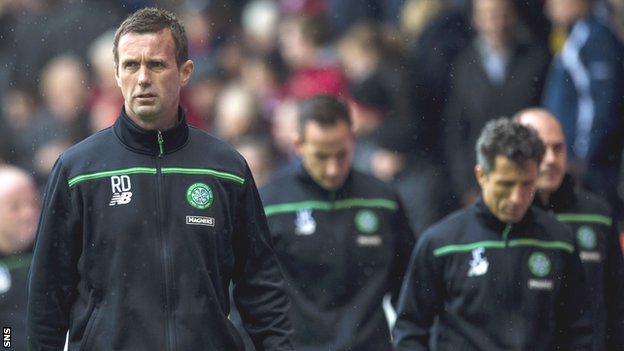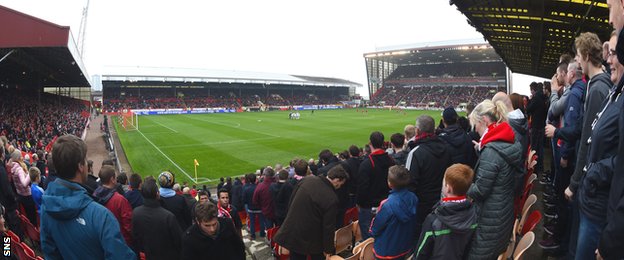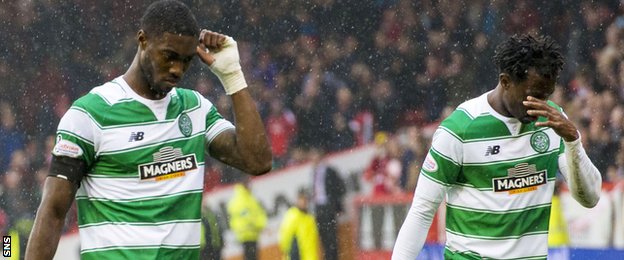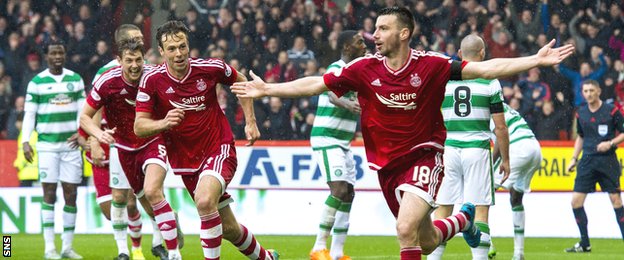
Celtic manager Ronny Deila, coach John Kennedy and assistant boss John Collins cut disconsolate figures at the end of the defeat at Pittodrie
Win over Celtic shows Aberdeen are a burgeoning force
There was so much to take in, but at Pittodrie on Saturday the scenes at the end of a tumultuous Aberdeen-Celtic game told you much about the current state of the big two in the Scottish Premiership.
There was the noise, first of all. Walls and walls of noise. There was the sight of a packed house and a winning Aberdeen team coming together in celebration – and it was powerful. The team answered all the questions we brought with us.
Are they a better footballing side than last season? Yes. Are they stronger psychologically? It would seem so. After four straight losses, are they capable of beating Celtic? They've done it. Are they capable of doing it in adversity? Yes, again.
It was hard to take your eyes off what was happening among the red masses but it was worth it, just to see what some Celtic players were up to. What happened was an illustration of where this team is at right now.

The fans at Pittodrie created a tremendous noise
Dedryck Boyata and Nir Bitton went to the referee, Craig Thomson, and gesticulated angrily. Boyata, in particular, was perilously close to losing the plot. The sense of injustice, presumably, came from an incident in the 34th minute when Thomson blundered in not sending off Andrew Considine for the foul that brought Celtic a penalty – and the lead.
Considine should have walked, no question. But, even still, this was a buck-passing exercise from these Celtic players, an attempt to shift the blame to a place – any place – except where the blame truly lay – themselves.
The strong-willed player would have accepted that though Thomson wronged them on the non-red card, their performance was lamentably lacking and deserving of nothing.
Sub-standard Celtic
It was the raging Boyata who needlessly gave away a penalty that levelled it up at 1-1. It was Celtic who played the last 20 minutes with a one-man advantage after Jonny Hayes was sent-off and yet did nothing with it.

It wasn't the best of afternoons for Celtic pair Tyler Blackett and Efe Ambrose
It was the Celtic manager who brought on Efe Ambrose, and not Saidy Janko, to replace Mikael Lustig. In Malmo, Janko was among the few Celtic players who held up fairly well., At Pittodrie, it was Ambrose who daftly gave away the free-kick that led to the winning goal.
When Ronny Deila was looking for a goal against 10 men he sent on James Forrest and then Nadir Ciftci and, inexplicably, kept Kris Commons on the bench.
Commons has a track record of tormenting Aberdeen, scoring 10 times against the Dons. How glad – and perplexed – the home fans must have been to see him staying put on the sideline. Deila's substitutions were a mystery.
More than that – and this cuts to the heart of the feebleness of Boyata's and Bitton's and, later, Leigh Griffiths' blame game – Celtic couldn't defend a routine delivery into their penalty area for the winning goal.
Craig Gordon, Tyler Blackett and Scott Brown were all culpable. So often in games of late, a ball comes into the Celtic box and there is wholesale panic. Nobody takes responsibility. Everybody is second-guessing each other. It's a collective defensive malaise that Deila has seen too often and has not fixed.
The mighty Quinn
For the winner on Saturday, Paul Quinn stood his ground, watched Celtic men leave him alone a few yards from goal and tapped it home. It was a goal that was illustrative of the improved mentality of Derek McInnes' team, but also another sign of Celtic's vulnerability.
It was a day for the Dons; joyous, and for some, lucrative. The bookmakers had them at 3-1 to win. In places, they were as long as 7-2. The odds-layers don't often get it wrong, but their prices were based on what happened last season and not what has been happening this season.

Paul Quinn celebrates his winning goal when he capitalised on Celtic slackness
Aberdeen are a stronger force, Celtic weaker. Aberdeen have added Graeme Shinnie and Celtic have lost Virgil van Dijk. Aberdeen have Kenny McLean, who has now settled into the team and is almost like a new player, and Celtic are without Jason Denayer.
Celtic's two departed centre-halves didn't just bring authority and defensive ballast to these fixtures last season, they brought goals. Important goals. Denayer scored the opener in two of the four meetings in 2014-15. Van Dijk scored the winner in another. Their absence has narrowed the gap.
Other key Celtic players from last season remain, but they're looking shadows of themselves.
Gordon is still a supreme shot-stopper but he has become indecisive when the ball is in the air around him. Boyata wants to play like Van Dijk but the better comparison is with the accident-prone Ambrose. Brown is toiling in midfield. The verve of Gary Mackay-Steven has been lost. On days such as Pittodrie, Stefan Johansen is a run-of-the-mill player.
Without the energy and goals of Griffiths, Celtic would have more problems. They have somehow got into a situation where the understudy to Griffiths is the unimpressive Ciftci and the understudy to him is Anthony Stokes, who isn't even mapped.
In the red corner, the challenger
There's another thing. On Saturday, Aberdeen did to Celtic what Celtic have done to them. They withstood a red card and then kick the 11 men with a sucker-punch at the end. They did with some quality and a lot of hunger. Aberdeen looked a side that needed victory like it needed its next breath.

It was clear how much the win over Celtic meant to the Aberdeen players
Maybe it was just a one-off. Maybe – surely – Celtic will galvanise themselves at some point and re-establish dominance through the course of the season, but Saturday was a day that dangled the carrot of a truly competitive league and a serious challenger to the team from the east end of Glasgow.
The thought of a real – and sustainable – title race is something that everybody should welcome, even Celtic. When the smoke clears, they should realise that fear can be a good thing. They've been without it for too long in the league.
Saturday showed that Aberdeen are a burgeoning force. They haven't just put Celtic on the back-foot. They've put them firmly on their backside.

